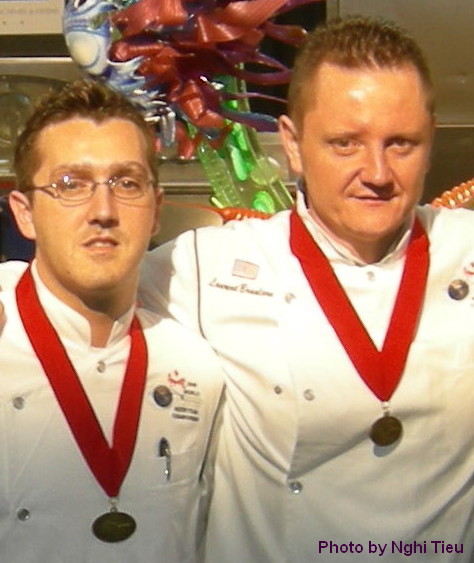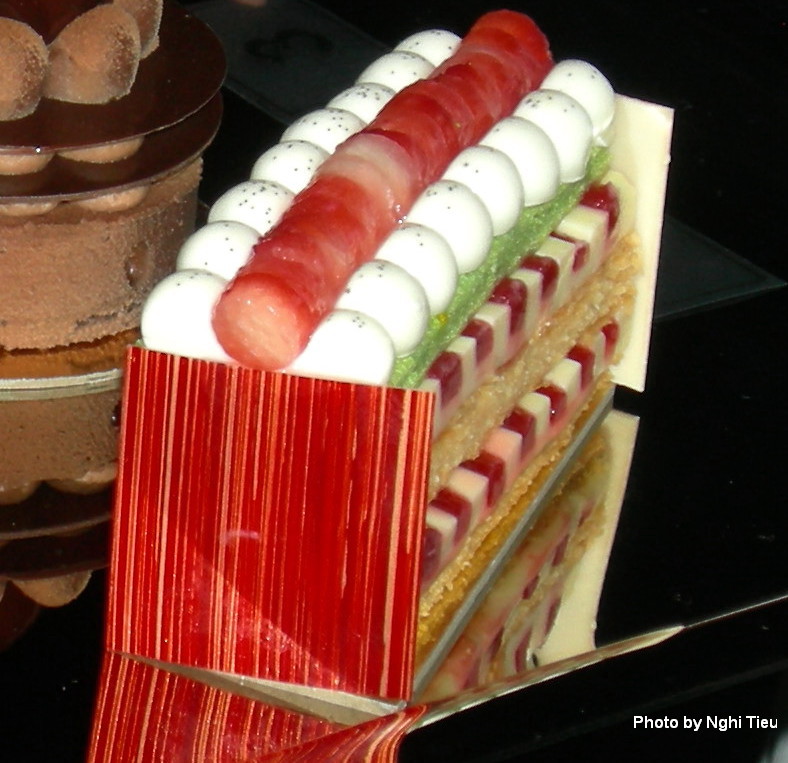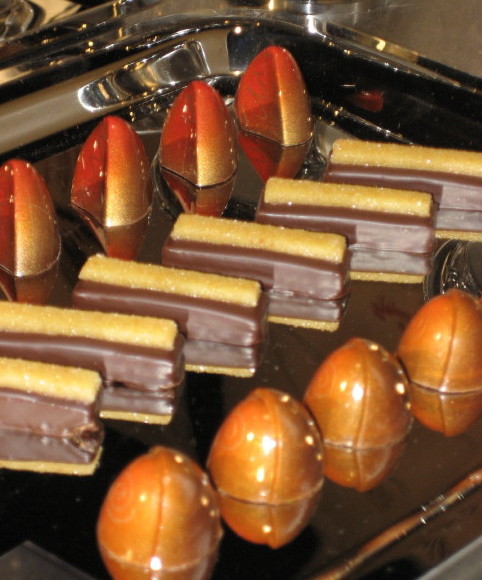
If Chicago pastry lovers wonder why they brave the impossible parking situation to satisfy their sweet cravings at Dimitri Fayard's Lincoln Park pastry shop Vanille, it's probably because they suspected what an international panel of pastry chefs just confirmed at the recently concluded World Pastry Championship: this guy is not just one of the best in Chicago. He's one of the best in the world.
In his debut performance in international pastry competition, Fayard took on the formidable task of developing and producing all of the American team's desserts while his teammates oversaw the creation of six-foot sugar and chocolate sculptures of astonishing luminescence and fragility. But when the judging was completed, it turned out that it was the taste of Fayard's desserts more than the other elements on which teams are judged, artistry or work technique, that gave the United States the gold medal victory margin over second place Japan at the two-day, thirteen hour competition in Nashville.

Dwarfed by the dazzling sculptures, the cakes do not always announce their own complexity to the naked eye. However, Jacquy Pfeiffer, co-head of Chicago's French Pastry School and coach of the 2002 gold medal U.S. team, speculated that Fayard might have used as many as 100 different recipes. "He had the least experience in this competition and he took on taste, which is always the biggest job," Pfeiffer explained.
None of this was apparently lost on the international panel of judges who taste the desserts layer by layer and then together with one clean swipe of the fork. In the end, Fayard's individually-sized pastries and his restaurant style dessert left nearly all of the competitors trailing far behind. Team Japan lost points for turning in its pastries too cold so the judges could not taste the flavors. Although the American and Japanese teams were evenly matched on artistry and work, none of Japan's desserts rivaled Fayard's cakes or ice creams, or his teammate's chocolate candies.
Only the Belgians, traditional favorites in the tasting category, came close to matching the scores Fayard delivered with his individual pastries - flavor combinations such as white chocolate mousse and exotic cremeux, or yuzu cream with strawberry gelée and vanilla panna cotta. Even strong scores for the Belgian desserts was not enough to compensate for the U.S. team's consistency. Pfeiffer summed it up, "The Americans just didn't make any big mistakes."

(Photo by Nghi Tieu)
This is a big victory for the 30-year-old Frenchman, one of the youngest ever to win this kind of competition. As the owner of a small shop in Chicago, Fayard started out "in the land of the giants," Michael Schneider, who has organized the competition since 2002, told me in reference to the elite pastry chefs who enter the competition, widely regarded as the premier international pastry championship. (Other competitions require pastry chefs to use sponsors' products in their recipes.) For Fayard, the conclusion is simple according to Schneider, "It's clear he is now on the A-list."

Victory at these competitions can never be assumed, not even for the French who have given their name to pastry. But France is always a lurking force. As in the Olympics, contestants don't always play for the home team. Japan's team captain trained in France. Fayard and his teammates Laurent Branlard and Stephane Treand are all French who work in the United States.
Despite a year of training and careful scrutiny of the rules, the first day of competition did not start especially well for the U.S. Shortly before the opening bell, the Belgian judge questioned whether some of the materials the U.S. team had brought for its sculptures were permissible under competition rules. After an almost-Talmudic discussion among the judges, the U.S. team was permitted to proceed and the first day began.
It was not so easy for the Japanese team to feign indifference when a swarm of judges and observers gathered around its kitchen to rule on whether it had violated the same regulation about the use of customized molds, which are costly and can favor well-sponsored teams. The team's captain had already begun pulling the luminescent olive green sugar for its sugar piece and he was clearly rattled. When the huddle of judges broke up, the Japanese were allowed to proceed.
Day One threw another challenge in the path of the U.S. team - not necessarily the kind of thing that is foreign to chefs like Branlard or Treand who run big operations at busy resorts in Florida and California. But an oven breakdown for a competition team preparing restaurant style desserts that need to be assembled and presented at the last minute doesn't leave a lot of room for adjustment, especially when judges deduct points for late delivery.
Masters of composure like Fayard and his teammates know that while prompt delivery is critical, the judges are also looking for professionalism, and any display of uneasiness might actually be worse. In the end, the team was given an extra 30 minutes to deliver the dessert. It was fortunate because "Pull the Spoon's" flavor profile -- including a clafoutis of banana marinated in passion fruit, baked pineapple, banana flambée sorbet, and an orange sauce released when judges lifted their tasting spoons - delivered the U.S. team a critical 28 point edge over the Japanese.
With the U.S. victory, the eyes of the pastry profession have one more reason to look on Chicago as a pastry innovator along with Paris and Tokyo. Three years ago, artisan bread baker Jori Downer from Evanston's Bennison's Bakery brought home the gold medal in the World Cup of Bread, and in 2001 the Chicago Ritz-Carlton's pastry chef En-Ming Hsu headed the American team that delivered the U.S. team's first gold medal in the World Cup of Pastry. Hsu was the first, and remains the only, woman ever to have done so and will be returning to Chicago this winter to teach.
